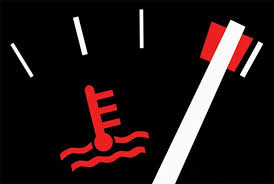Summer Heat and Your Truck

In order for drivers to operate a commercial motor vehicle (CMV) in a safe manner they need to understand how heat affects the operation of the truck. Two areas that drivers must pay attention to during their inspections are the engine coolant and the tires.
Engine Coolant:
Extended life coolants (ELCs) started gaining traction in the commercial truck industry around 2005. In many cases the coolants last the life of the engine: 600,000 miles for heavy-duty diesel truck engines. Some claim even longer. It's highly advised to check your coolant levels daily, or at least every time you fuel up. It is estimated that 50% of all engine failures are associated with some type of overheating of the engine.
An engine running low on coolant runs the risk of damaging the emission components, such as the exhaust gas recirculation (EGR). Your system may lose up to 10% of its fluid per year; every cooling system leaks a small amount, but a 10% loss could introduce air into the system, causing real issues. The benefit of using ELC is that you can improve the engine's heat transfer rate by 12% to 13% over conventional anti-freeze.
During the pre- and post- trip inspection, driver(s) should:
- Make sure that the coolant level is within range of the coolant reservoir marker.
- If the coolant level is low, contact your Idealease service provider immediately for direction. ELC should be a red/orange color and should be free of dirt, debris, rust and other contaminants.
- Do NOT combine ELC with mixed conventional anti-freeze!
- If a dash light comes on with an overheat warning while driving the vehicle, immediately pull into a safe parking place and contact your Idealease service provider for direction. Operating the unit in an overheat situation can severely damage the engine.
Click here to learn more about extended life coolants.
Tires:
During the summer season when the ambient temperatures can rise above 100° F and road temperatures can reach almost 200° F, the heat problems caused by under inflation are more extreme. Tires that are run under inflated will be more prone to failure in these temperatures. A famous tire engineer once stated, “Heat is to tires as Kryptonite is to Superman”… in other words, heat is your tires' worst enemy.
What can drivers do to minimize tire related issues during the summer months?
- Tire pressures need to be checked more frequently in the summer.
- Tire pressures need to be checked when the tire is “cold” and not after operation. Pressures can increase during operation when “hot” by as much a 15% giving you a false reading.
- Inspect tires for punctures and damage during pre- and post-trip inspections and stops. Tire punctures tend to increase during the summer, because the tread rubber becomes hotter and “softer” and acts as a magnet to nails and road debris.
Click here to learn how to maintain your tires adequately.






